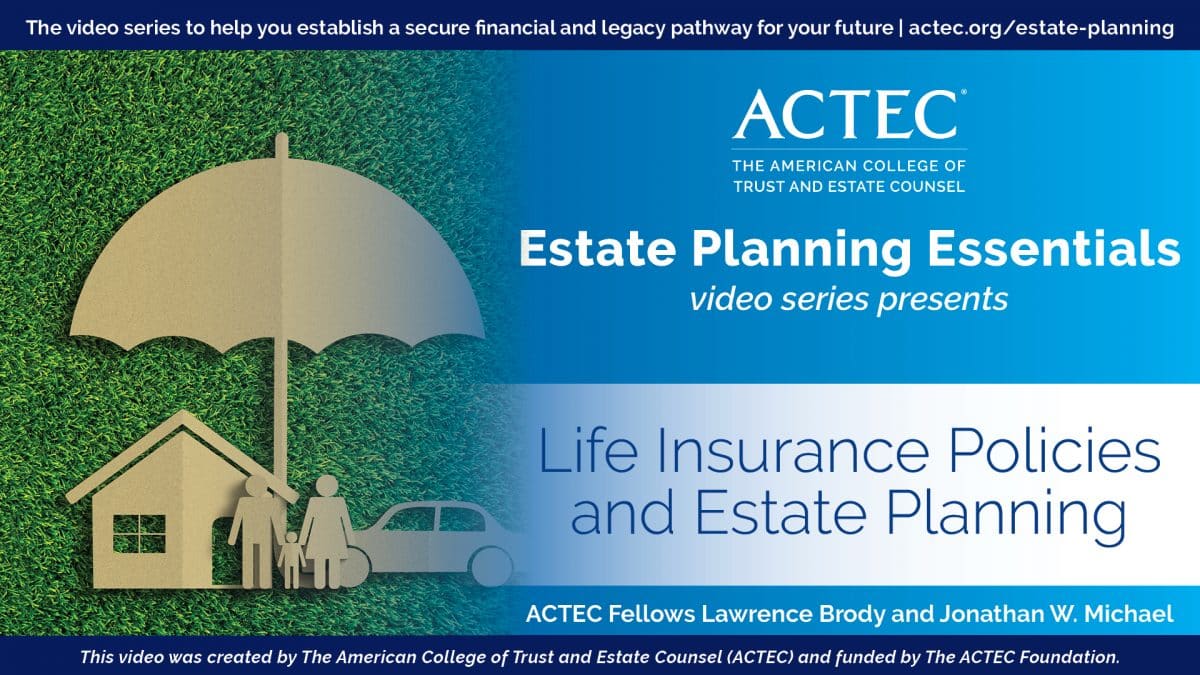Life insurance policies usually involve the owner, the insured, and the beneficiary. Can you be both the owner and the insured? What is an irrevocable life insurance trust? What’s the insurance agent’s role in the process? ACTEC Fellows Lawrence Brody and Jonathan W. Michael answer these questions, what policy owners should consider when making decisions and discuss strategies for managing multiple beneficiaries.
Transcript
Hello, my name is Jonathan W. Michael. I’m an ACTEC Fellow in Chicago and today I’m here with Larry Brody, an ACTEC Fellow in St. Louis. Hi, Larry. How are you?
Hey, Jonathan. I’m fine. How are you?
I’m doing great. Larry, thank you for joining us. Today, I guess your topic is choices of life insurance policy ownership. So, right off the top, who’s available as the owner of a life insurance policy?
I think probably the way to begin this is to remind people that there are a number of individuals involved in any life insurance policy. The first person, if you will, is the insured, whose life is being insured. That’s the person that has to take the physical to get the policy. That’s usually the person who’s going to pay the premium. And every life insurance policy has a named insured. Some life insurance policies insure two insureds, usually husband and wife, payable only at the death of the survivor. So, you can have a single life insured or you can have multiple lives insured, but every policy has an insured or insureds.
The other person involved in a life insurance policy is the owner of the policy. There are a number of choices for who can own a policy but every policy has an owner. The owner is the person who has control of the policy during the insured’s lifetime. They have the power, if they want, to surrender the policy, to sell the policy, to gift the policy, to change the policy death benefit beneficiary. They have absolute control over the policy during the insured’s lifetime. And the third person involved in the insurance policy is the beneficiary. That’s the person, sometimes an entity like a corporation or a partnership or a trust, that’s entitled to receive the death proceeds of the policy at the death of the insured.
So, all life insurance policies have three people involved, three categories of people. Sometimes the categories overlap, as we’ll talk about. But there are usually three people involved in policy: the insured, the owner, and a beneficiary.
So, Larry, maybe you can talk a little bit about the different owners? So, one, might be the insured?
Yeah, the first person people think about as the policy owner is the insured. It’s the simplest way to do it. So, in this case, there’d be only two people involved in the policy because the insured and the owner would be the same. There’d still be a beneficiary but there wouldn’t be a separate owner from the insured. My sense is, most life insurance policies are owned by the insured. The insured’s the one whose life is insured. They’re the one who are paying the premium and, in general, I think, they want to control the policy. They want to make the decisions about the policy. If the policy has investment choices, they want to make those choices. They want to have the right to change the beneficiary. So, if I own the policy on my life, I’m both the insured and the owner, I name my son as the beneficiary. If, at some point, my son and I have a falling out I have the right to change the beneficiary. Right? I have full control.
The next possible owner, in no special order, is my spouse. So, in that case, there would be three people involved. I’d be the insured. She’d be the owner, and she might be the beneficiary, or she might name our son as the beneficiary. Again, she would have full control over the policy and, as the insured, I’d have to be willing to have her do that. Some insureds are comfortable with that. Some insureds are not. And again, it may depend upon the relationship between the spouses.
Again, some insureds are control freaks. If they’re paying the premium, they want to own the policy. Other insureds might be more comfortable with their spouse owning the policy. One advantage of having the spouse own the policy, for instance, is if the insured is worried about creditor problems having the policy owned by the spouse ought to solve that for the insured.
But could you have your children as an owner?
Sure. Yes, you could certainly have adult, responsible children as the owner of the policy. In that case, again, there might be three people. There might be two people. I’d be the insured. My son would be the owner. He might be the beneficiary. He might name someone else as the beneficiary, but generally he would name himself as the beneficiary. It’s fairly easy with one child. If I have three children, for instance, if I make all three of them owners of the policy, no one child can do anything without the other two. It takes, in my case, three to tango. All decisions have to be unanimous.
So, if two of the children want to cash in the policy and the third one doesn’t, you can’t cash it in. You have two that want to change the beneficiary and the third one doesn’t; you can’t change the beneficiary. In that case, we sometimes suggest the insured create some entity, like an LLC or a general partnership, name one of the children as the manager to give that child control over the policy, even though, at death, again, all three children would be the beneficiaries.
How about this thing that’s called an irrevocable life insurance trust? I know that you know what that is. Can you explain to our listeners what is an irrevocable life insurance trust and when might it be the owner?
There are irrevocable life insurance trusts. They are generally created by wealthy insureds to own a policy on their lives where the trust would be the beneficiary. So, in this case, again, there’d be two people involved. I’m the insured. My insurance trust, with someone else as the trustee, is both the owner and the beneficiary of the policy. They’re generally created by wealthy clients who think they’re going to have a federal estate tax problem at their death because their estates are large enough. The benefit of having the policy owned by an irrevocable insurance trust is, first of all, again, it’s not subject to claims of my creditors anymore.
I can also keep the trust going for my beneficiary, so if I have a child who’s a spendthrift, if I make my child the owner of the policy and he’s the beneficiary, he gets the insurance company check. He can do whatever he wants with it. If my trust gets it with a trustee I trust, they will hold the proceeds for him and perhaps just directly pay his bills. But the real incentive for an irrevocable insurance trust, again, is to keep the policy death proceeds out of the insured’s estate for federal estate tax purposes. Because the rule for federal estate tax purposes is, again, if the client’s estate is large enough, if the insured owns the policy, you count the death benefit of the policy as a part of the value of his estate on which we have an estate tax.
If it’s an irrevocable insurance trust and it’s been there for more than three years after I created the trust and put the policy in, the policy proceeds are not subject to the federal estate tax, which is generally the incentive for creating an irrevocable insurance trust. They’re complex they’re expensive, and they’re really only for high-net-worth people.
But it seems like there’s a lot of choices out there in terms of not only who can be the owner, but then also who can be the beneficiary and who the other parties are in respect to these policies?
Yes. And again, I think that’s part of the job of the insurance agent: to make clear to the proposed insured what the choices are for ownership and what the advantages and disadvantages of each one are. And everybody will have a different view of who ought to be the owner of the policy. I would guess offhand that most policies are owned by the insured, but they’re not the only choice.
All right. Well, thank you, Larry. This has been very helpful. Thank you for leading the discussion on choices of life insurance policy ownership. Have a great day.
Thanks, Jonathan.
Thank you.
Featured Video
Life Insurance Policies and Estate Planning
A general overview of the risks and rewards associated with term and permanent life insurance policies and factors to consider in choosing the right policy.
ACTEC Estate Planning Essentials

ACTEC Fellows provide answers to frequently asked trust and estate planning questions in this video series.



